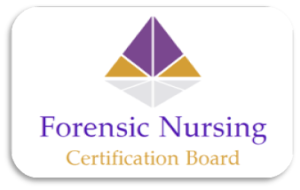FNCB Certification and Recertification
All FNCB Certifications and FNCB Questions, Answers, Explanations, Instructions, Educational Offerings, SWAG… EVERYTHING is proprietary, copyrighted, trademarked, and property of the FNCB.
FNCB Certifications
Certifications, whether required for licensure and/or employment or not, add value to the RN’s role and resume. For the Advanced Nursing Practice (graduate degree), certifications are often required by State Boards of Nursing to practice in the state. Regardless, certifications signify the forensic nurses’ commitment to lifelong learning and the delivery of quality specialty care as a forensic nurse.
Why Get Certified?
- Earning certification in a specific care area is usually required for licensure as a Registered Nurse and/or Advanced Nurse Practice (e.g., nurse practitioner, clinical specialist, midwife, or anesthesia). Board certifications are a method to test the minimum competence of the provider, and usually have the abbreviation BC or C in the title (for example, a board-certified family nurse practitioner is an FNP-BC or a Pediatric Nurse Practitioner is PNP-C).
- Specialties may or may not require certifications, although having one demonstrates that the nurse or advanced nurse received further education in the care of specific patient populations, often considered an expert in the area of specialization.
- Also, while not always required for licensure, some employers require specific certifications depending on the vocational role. Many nurses find that having certification in their specialty or sub-specialty of choice enhances employment opportunities.
Certification Requirements
- Each certification has unique and specific certification requirements. Candidates desiring certification thoroughly research their area of expertise to ensure that they meet the conditions for certification.
- An RN degree (sometimes an advanced degree, like an MSN), an unencumbered RN license, a minimum number of direct-care hours in the specialty, and a certification test are usually all required for a nurse to become certified in an area of care.
- Nurses should also keep in mind that certification renewal requirements are essential for current evidence-informed practice. Certifications have expiration dates, and often require practice in the field, and continuing education from accredited providers.
- FNCB delays certification conferral when aware that an applicant has an open complaint or investigation at their State BON. If misconduct is determined, the applicant is denied certification, where currently certified individuals is also denied the certification through a process of suspension or revocation. Further, FNCB reports suspension or revocation of certification to employers, legal authorities, state boards, third-party payers, and other third parties.
Go to FNCB Shopping for FREE Certification Handbook (PDF)!
Welcome Message & Certification Explanation
Dr. Stacey A. Mitchell, FNCB Immediate Past President (2020 – 2022)
Recorded During Dr. Mitchell’s Presidency in 2021
FNCB Re-Certification
FNCB certification renewal supports current science of professional development because engagement in continuing education and forensic nursing practice are requirements for certification renewal. FNCB certification as a Generalist Forensic Nurse Certified (GFN-C or Advanced Forensic Nurse (AFN-C™) or any of the micro-certifications follow the process outlined in the FNCB publications.
All FNCB Certifications are valid for a period of three years from the date of credential conferral.
Certification Renewal Eligibility Requirements
Renewal applicants meet the following eligibility requirements:
- Hold a current, active, unencumbered RN license in a state or territory of the U.S. or the professional, legally recognized equivalent of the RN license in another country.
- Be currently certified by FNCB with the credential in which certification renewal is being sought.
- Meet the renewal requirements for the certification for which the applicant is seeking renewal.
- Submit an updated profile with the applicable fee for the current certification.
- Update your profile throughout your certification period!
FNCB Shopping for FREE FNCB Certification Handbook (PDF)!
FNCB STUDY GUIDES are free with payment of a certification examination!
